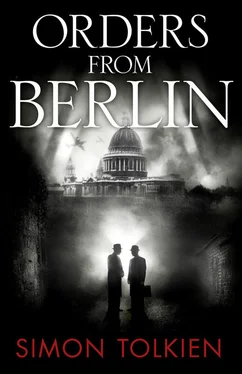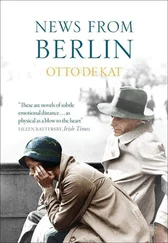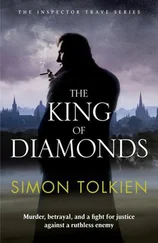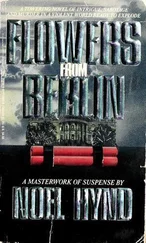Simon Tolkien - Orders from Berlin
Здесь есть возможность читать онлайн «Simon Tolkien - Orders from Berlin» — ознакомительный отрывок электронной книги совершенно бесплатно, а после прочтения отрывка купить полную версию. В некоторых случаях можно слушать аудио, скачать через торрент в формате fb2 и присутствует краткое содержание. Жанр: Полицейский детектив, на английском языке. Описание произведения, (предисловие) а так же отзывы посетителей доступны на портале библиотеки ЛибКат.
- Название:Orders from Berlin
- Автор:
- Жанр:
- Год:неизвестен
- ISBN:нет данных
- Рейтинг книги:4 / 5. Голосов: 1
-
Избранное:Добавить в избранное
- Отзывы:
-
Ваша оценка:
- 80
- 1
- 2
- 3
- 4
- 5
Orders from Berlin: краткое содержание, описание и аннотация
Предлагаем к чтению аннотацию, описание, краткое содержание или предисловие (зависит от того, что написал сам автор книги «Orders from Berlin»). Если вы не нашли необходимую информацию о книге — напишите в комментариях, мы постараемся отыскать её.
Orders from Berlin — читать онлайн ознакомительный отрывок
Ниже представлен текст книги, разбитый по страницам. Система сохранения места последней прочитанной страницы, позволяет с удобством читать онлайн бесплатно книгу «Orders from Berlin», без необходимости каждый раз заново искать на чём Вы остановились. Поставьте закладку, и сможете в любой момент перейти на страницу, на которой закончили чтение.
Интервал:
Закладка:
There was no hot water, but she forced herself to sit in a cold bath while she washed her hair and then sat shivering at her dressing table, taking inventory of her make-up. Not so long ago she had had a full set of cosmetics, and now she was shocked to find that she had practically nothing left. Married life with Bertram had given her no reason to replace her powders and paints as they ran out, and even if she had wanted to, the war had made most make-up either unobtainable or much too expensive for her tightened purse.
An almost empty bottle of French scent reminded her of a time when Paris had been a place of magic and glamour instead of just another outpost of the Nazi empire. As a teenager she’d imagined going there on her honeymoon, but Bertram’s finances had barely stretched to a weekend in Bournemouth, and now it was too late. All her life she’d never left England, and recently she’d begun to wonder if she ever would.
She needed to be ingenious. That was the answer. Apart from the scent, she had a little lipstick and an unused jar of cold cream. She mixed them together to make a rouge to match her lips and then used a solution of sugar and water to set her hair. Some more cold cream mixed with a few flakes of Bertram’s shoe polish gave her a passable imitation of mascara. It would have to do.
Ava had one good dress. It was a black-and-sequin affair with a narrow waistline and plunging neckline modelled on an outfit that Greta Garbo had worn in Anna Karenina five years earlier. Her father had bought it for her before the war in a rare moment of generosity, and she had kept it ever since at the back of her wardrobe for special occasions that never seemed to happen, so that it was almost as good as new. She’d thought it fabulous when she first got it, but now it seemed out of place in the make-do-and-mend world of 1940. She worried that Seaforth would think her over-eager, but she needed the dress to maintain what little was left of her brittle self-confidence, and she felt reasonably pleased with the overall effect when she studied herself in the mirror again at six o’clock. As a final touch, she put on a thin necklace made of imitation emeralds. It complemented her green eyes, which she secretly thought to be her best feature.
All that was missing were the stockings. She’d found to her horror that all her rayon pairs were laddered, but she resisted the temptation to follow the advice in a Picture Post article she’d read a few weeks before that suggested girls should draw a line with a soft lead pencil up the backs of their calves and thighs to make it look as if they were wearing silk. It wasn’t worth the risk of humiliation if Seaforth saw through the deception, and Ava consoled herself with the fact that, true to its era, the dress’s hemline fell well below the knee.
She put on her coat and picked up her bag, then paused just as she was about to go out of the door, looking back at the flat. Bertram was gone, but his possessions were everywhere — his doctor’s bag on a chair, his hat and mackintosh hanging on the coat rack, his war map on the wall. She rebelled against the silent reproach of these inanimate objects, filled with a sudden anger against their owner. It was her turn to have a chance at life. Abruptly, she took hold of her wedding ring and pulled it from her finger. It didn’t come off easily and she had to tug hard. The knuckle was sore afterwards, but she welcomed the pain. It marked her departure from the married life she wanted desperately to leave behind. She felt like throwing the ring away, but an unexpected caution stayed her hand and she dropped it into her purse instead.
In the communal hallway downstairs, she almost collided with two of her neighbours as they came in through the front door. They looked at her askance, barely returning her greeting. News travels fast, thought Ava. She hadn’t read the newspapers for the last two days, but she found it hard to believe that there hadn’t been some report on Bertram, and there would be more to come. She’d be lucky if it didn’t make the front pages: battersea staircase murder — woman’s husband charged with father’s murder. A nice salacious story to distract Londoners from the misery of the latest casualty figures, but for Ava it would be the ruin of her reputation. She would be transformed overnight from an anonymous housewife into an object of ridicule. There would be no going back. Ava shuddered, pulling her coat tight around her body as she turned the corner at the end of the street, heading towards the river.
This time it was Seaforth who was late. They had arranged to meet by the fountain in Sloane Square, and she had just begun to think that he wasn’t going to come when she caught sight of him hurrying across the King’s Road towards her.
She’d wondered on the bus if he was going to kiss her when they met. She didn’t know whether she wanted him to or not, but then when he did, brushing his lips against her cheek, she found she liked it and that she wanted him to do it again. She had to be careful, she realized; she had to resist the spirit of recklessness that seemed to possess her whenever she was with him.
He’d booked a table in a small Italian restaurant. It was on a side street just off the square. At the corner, by the Underground station, they passed two newspaper hawkers who were shouting the evening headlines, competing with each other for attention. They seemed to take it in turns, each news item more horrible than the last and bellowed in a louder voice.
‘Read all about it: Hospital hit in Shoreditch. Seventeen dead.’
‘Land mine explosion in Whitechapel. See all the latest pictures.’
‘I hate this war,’ she said, hurrying past. ‘You can’t get away from it.’
‘And you can’t stop it, either,’ said Seaforth. ‘It’s like a machine they’ve turned on and now they can’t turn it off. However hard they try, they can’t put the genie back in the bottle. Not that they seem to be trying too hard, judging by Churchill’s fighting talk.’
‘That’s because it’s too late. No one in this country wanted war.’
‘Maybe not. But that’s not my point,’ said Seaforth, warming to his theme. ‘Think of the last war: the war to end wars. Four years of slaughter, and for what? Twenty years of peace. Doesn’t that tell you anything, Ava? About what’s happening; about the future?’
‘You can’t talk like that,’ she said, appalled by Seaforth’s cynicism. She couldn’t understand it — it was almost as if he were happy about the arrival of Armageddon.
‘Why not? If it’s the truth? Wars are fought so that the people who make the machines can make money out of them. The only difference now is that the machines are more powerful and the weapons are more deadly. I tell you, behind every tank, behind every bomb, is a man with a roll of banknotes — pounds or Reichsmarks, it doesn’t matter.’
‘I don’t know. Maybe you’re right,’ she said. ‘But that doesn’t mean that we don’t have to fight. The Germans are evil. Everyone knows that.’
‘What. All of them?’
‘Yes, all of them,’ she insisted. ‘There was a woman in the butcher’s shop the other day who told me about one of their fighter pilots flying low over the park last week. He saw her out with her children and he tried to machine-gun them. She got the kids under a bench and lay on top of them, and they survived somehow. But she said he was laughing — laughing while he tried to kill them. Can you believe that? I hate the Germans. And I’m surprised you don’t too,’ she added passionately. ‘They killed your father, didn’t they? Isn’t that what you told me?’
Seaforth flinched and she stopped, wishing she could take her words back. ‘I’m sorry,’ she said. ‘I shouldn’t have said that.’
Читать дальшеИнтервал:
Закладка:
Похожие книги на «Orders from Berlin»
Представляем Вашему вниманию похожие книги на «Orders from Berlin» списком для выбора. Мы отобрали схожую по названию и смыслу литературу в надежде предоставить читателям больше вариантов отыскать новые, интересные, ещё непрочитанные произведения.
Обсуждение, отзывы о книге «Orders from Berlin» и просто собственные мнения читателей. Оставьте ваши комментарии, напишите, что Вы думаете о произведении, его смысле или главных героях. Укажите что конкретно понравилось, а что нет, и почему Вы так считаете.












